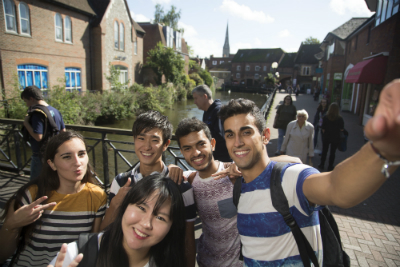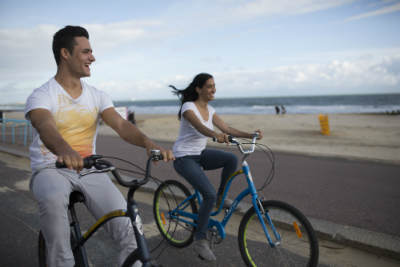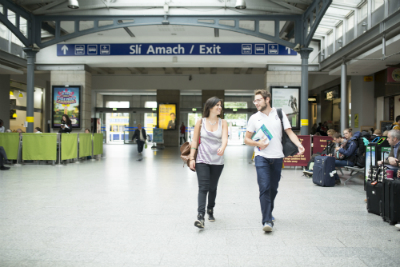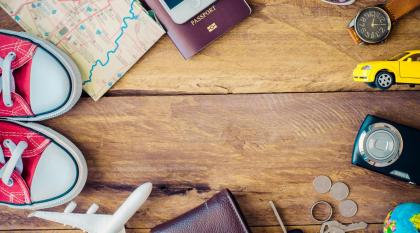How to Reduce the Cost of Studying Abroad
Studying abroad is a great opportunity not only to improve your English skills, but also to experience a new culture and grow enormously as a person. However, the cost of getting yourself abroad can sometimes seem as daunting as the logistics. Here are some tips to cut down costs and make the study abroad experience that much more accessible, whether you're thinking of going to the US, UK, Australia, or any other destination.

Be careful buying flights
One of the largest initial costs of getting abroad is the actual flight or transportation there and back, particularly if you’re traveling to a different continent. Flight comparisons websites such as kayak.com have made the process of finding an affordable flight much simpler than in the past. Although airline flight costs change frequently, generally a safe bet is to book several months in advance to avoid rising prices. Especially if you’re trying to save money, consider some less attractive flights with long layovers in other airports along the way. Bring a charger and load up a few podcasts, movies, or good books. The actual travel day will seem very long, but the savings can be enormous, and if you’re abroad for several months or a year, giving up a day or two to traveling isn’t so bad in the long run!
Also, if you’re looking at flights over several days, clear your browsing history before going back again. Sometimes the website will remember that you’re interested in a specific destination and nudge the price up little by little every time you check.
Oftentimes you have the option to buy travel insurance when booking you trip. Although it adds a slight extra cost, it saves a lot of money in the event that you are no longer able to use your flight for unforeseen reasons.
Use ATMs instead of exchanging currency
Living in a new country, you’ll need money in the local currency to buy daily things and take full advantage of the local area. Every time you convert your home currency into the local currency, you'll often have to pay someone. The conversion rate will almost always better for you if you take money out of an ATM rather than converting at a currency exchange or the airport. There could be some fees involved with using an ATM, but overall it's still cheaper than going to a currency exchange location, and if you're lucky you can avoid many of the ATM-related fees.
Many banks charge you a set percentage of your withdrawal to convert the currency from your home currency, and will often also have a flat foreign transaction fee. The ATM in your new city may also charge a fee for using a non-local bank. All of these small fees add up! Avoid them by doing some research before leaving home: you might be able to find a bank that does not charge you conversion rates abroad, and may even reimburse you for fees charged by other ATMs a certain number of times per month. If you know that your bank will be charge a fee, consider taking large amounts of money out at a time from an area you trust, and keeping the excess money locked in a safe place and until you you need it. This way, you don’t have to pay the fees over and over.
You can also look into trying a currency swap such as WeSwap, which is an agreement where you sell your home currency to someone from your destination country in exchange for their local currency. The rates with these swaps can be very attractive.
Find out more about local currencies in our destinations.
Take a minute to get to know public transportation
Once you’ve arrived in your new city, you’ll have to worry about getting from place to place during your stay. If you’ll be in a city for a long time, some cities will offer long-term transportation passes at a discounted rate. Consider how much you’ll be using transport and decide what makes the most sense for you.
Also, depending on the size of your city and how far you need to travel, sometimes it can be worth a slightly longer journey by foot. You can often also find a cheap used bike on Craigslist, Gumtree, or other similar sites at the beginning of your stay. It's pretty fast to get around, you can use it throughout your time in your new country, and then get rid of it again before going home. This not only saves you money, but helps you get to know the streets of your new home, and get a bit of exercise as well!

Look into student discount cards
Depending on which destination you choose, there will likely be a variety of student discount cards available to you. Some cities' museums and attractions offer discounts to students – or are even free! – and require only a student ID as proof. Other times, you can purchase a discount card and get reduced prices at stores and on transportation. Depending on how often you plan to travel or how much you shop, these discounts can have a large impact. Do a bit of research before choosing and arriving at your destination and be prepared for savings when you get there!
Be smart with trip planning
While you’re abroad, you’ll probably also want to travel to explore the region. If you take the time to think wisely and are okay with giving up some luxuries, you can save yourself a lot of money. Overnight trains and buses are often cheaper than other options. Also, in some cases, with overnight transport you can not only spend less on travel costs, but also eliminate the need to pay for hotels or hostels.
You might be a bit tired at your destination, but it’s nothing a cup of coffee and a burst of excitement can’t conquer! When all is said and done, you’ll remember all the cool things you got to see, and not the few hours of sleeping in a bed you might have missed out on.

Don’t buy souvenirs
After a trip is over, it can mean a lot to have a physical object to associate with a good memory. But, at the end of the day, the important thing is that you went! You probably don’t need that extra snow globe or sweatshirt. In fact, you can get some souvenirs without even realizing it – ticket stubs, brochures, old transport passes, and lots and lots of photos are all things you can stick on your wall at home or in a scrapbook to remind you of your stay without paying anything extra. Everyone loves a souvenir, but wouldn’t you rather be able to afford a second trip than load up on odds and ends from the first?
Hunt for good deals
Living abroad is no different than living at home; while it can be easy to go into a store and buy whatever you fancy at the time, if you’re smart and look around you can probably find good deals and coupons to use. Also think about which stores you shop at – ask locals about which stores have a reputation for being cheaper. Saving a little on your weekly groceries amounts to a large difference over several weeks. Many cities will also have markets selling produce and other products from local vendors. Not only does this give you a chance to interact with locals, but the costs are often much cheaper for foods that are even fresher than in grocery stores.
Similarly, popular discount providers like Groupon can not only provide you with new ideas for things to try with friends, but can let you do them for cheaper! Be sure to ask the locals about where might be a good place to look for discounts in your local area.
Be thrifty with means of communication
In some places, phone plans can be quite expensive, especially if you want to use a lot of data or add on an international plan to be able to call home. You can save a lot of money by minimizing your data usage and relying on Wi-Fi whenever possible (available free at all Kaplan schools!). Many cafés have free Wi-Fi and provide a great time to get a warm drink and pastry, recharge your phone, and catch up with friends throughout your day.
For contacting home, use Skype, FaceTime, or some other Internet-based medium and avoid the cost of calling cards and expensive international plans. Find more advice on using your cellphone abroad.

Take advantage of libraries and nearby facilities
Enjoy reading and watching movies? Not only can these be a good way to pass the time, but a great way to work on your language skills and get to know the local culture. However, going to movies every weekend and buying every new book gets expensive, plus you now have a pile of books to bring home!
Most Kaplan schools have libraries available to their students to check out books and movies for free, or else students can often access the libraries of nearby towns and universities.
Consider your destination
One of the biggest factors influencing how much you’ll spend abroad is the cost of living in the local area. Flashy, world-famous cities such as New York and London are enormous fun and have endless things to do, but this can come with a hefty cost of living! The prices of food, drink, clothing, and just about everything else in smaller cities is much more affordable, and you’ll also save on transportation costs. You’d be surprised how many fun things you’ll find to do even in a city you don’t know as much about.
As an added bonus, it’s much easier to feel like a local and to really get to know the local way of life in a city with fewer tourists! Not every American lives in New York, and not every Brit lives in London: give yourself a chance to see how the rest of the country lives.
Keep all of these things in mind, and traveling abroad is much more affordable than it might seem. Any other tips on how to reduce the cost of studying abroad? Let us know in the comments

